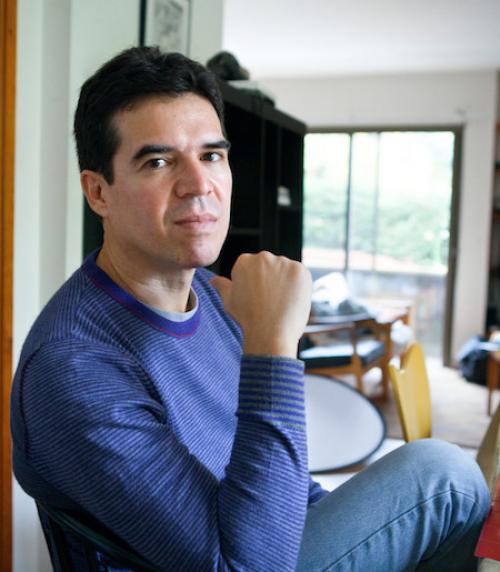As a child growing up in Bolivia, Edmundo Paz-Soldán, Romance Studies, loved to read and write—and ultimately to tell stories. Yet he shied away from devoting his life to literature at first, thinking instead that his craving to be useful to society could be fulfilled through a political career.
“Then I realized that I didn’t have the temperament to be a good politician,” he says. “And I thought, maybe a good way to connect with people is through something I love—through writing. Maybe as a writer I could talk about political and social issues. My first three novels had large political and social components. That’s a big part of the Latin American writing tradition.”
Writing Becomes the Way
Since those early days, Paz-Soldán has written eleven novels and five short story collections. He’s also authored numerous scholarly nonfiction articles, exploring aspects of Latin American literature, and edited critical anthologies on canonical authors such as the late Chilean writer Roberto Bolaño. Along the way, he’s won the prestigious Juan Rulfo Short Story Award for his story “Dochera;” universities have held conferences on his work; and his writing has been translated into eleven languages.
In the fall of 2018, he received word that one of his most popular novels, Norte (University of Chicago Press, 2016), was optioned for a movie by RT Features. “Norte deals with immigration, and I assume they were interested because that’s a hot topic right now,” Paz-Soldán says.
Norte
The novel’s story arc covers 80 years and focuses on three characters who crossed the United States-Mexico border to live in the United States. Two are based on real people. The third is a Latina girl who was raised in the United States and wants to tell the story of her community through writing comic books. To bring the characters to life, Paz-Soldán researched the lives of the two immigrants who were inspirations for his fictionalized account. One was the visual artist, Martín Ramírez, a Mexican immigrant to the United States who spent 30 years in a California mental institution diagnosed as schizophrenic.
“His is a very American story in the sense that he taught himself to paint,” says Paz-Soldán. “After his death in 1963, he was discovered by the art world. Now he’s considered a very important artist in Latino painting.”
A Perverse Way of Being Human
Paz-Soldán’s other real-life inspiration was Angel Maturino, a serial killer along the United States-Mexico border and one of the most wanted men by the FBI in the 1980s. “I wanted to talk about violence along the border,” Paz-Soldán says. “It’s a highly charged subject because politicians have instrumentalized it and turned it into an accusation against a whole minority. When I was writing this section on the serial killer, my challenge was how to write him without turning him into a caricature. I assumed that readers will think what he’s doing is repulsive, so I didn’t have to tell them that. I could try to enter his psyche and see how he sees his actions, why he does what he does. That was the challenge.”
“The volunteers start seeing visions from the past. They talk of things as if they’d experienced them.”
Some reviewers criticized the depiction of the serial killer as too violent and saw him as an inhuman monster. “The violence in the novel was not just for the sake of it,” explains Paz-Soldán. “There was an idea behind it. I was trying to show what violence produces—the horror of it all, the fear and destruction it causes. At the same time, I don’t see the serial killer as inhuman. It’s important that we understand this is a perverse way of being human. Because as humans, that’s one of the things we do to try to rationalize this behavior. We say it’s inhuman. But I think we need to realize that part of the human condition is this capacity for violence that we need to explore and understand in order to make sense of the world.”
The Twelfth Novel
Paz-Soldán is currently writing his twelfth novel, La mirada de las plantas. Set in the present-day jungle of the Amazon basin, the novel looks back at the early decades of the twentieth century. “This novel deals with the traumatic history of the rubber boom,” he says. “It was a grim time for the region. The rubber boom provoked the interest of many foreign companies, especially British ones, and there was a lot of exploitation, not only of natural resources but also of indigenous people. The story deals with the ghosts of that time that still influence the region.”
As in many of Paz-Soldán’s works, the novel has a speculative thread running through it. A company along the Brazil-Bolivia border is conducting experiments with a powerful hallucinogenic drug in order to create a virtual reality game, which allows players to experience the high of the drug without actually ingesting it. The company has recruited volunteers to take the drug and then record their visions for later use in the game.
“The volunteers start seeing visions from the past,” says Paz-Soldán. “They talk of things as if they’d experienced them. The main character, who is a psychiatrist, figures out they’re speaking about the history of the region—the exploitation. So the question is, are they connecting with a communal dream, or is there something that’s being put into the drug, or is the plant that the drug is made from telling them the story of the region?”
The Novel—More Than Imagination
While the novel is highly imaginative, it is grounded in solid research, Paz-Soldán explains. “Many people think everything is imagination for novelists,” he says. “They don’t see that a lot of research is involved, which is a good thing, I think. It’s not like when you write an academic scholarly paper. The investigation there is much more methodical. As a novelist, you move from one place to another in the storytelling, but you still have to do research.”
Paz-Soldán’s latest work reflects a new interest in rural issues among Latin American writers. “In the last couple of decades in Latin American fiction, there was a preoccupation with urban settings,” he says. “As a continent, Latin America has become more urban than rural. But I believe we still need to explore what’s happening in the jungle or the countryside, because those places outside the urban settings are where there is still exploitation, abuses, deforestation, and lots of other things that we need to take into account when we talk about Latin America. The powerful influence of extractivist policies in the region is still one of the main questions for Latin American writers.”




